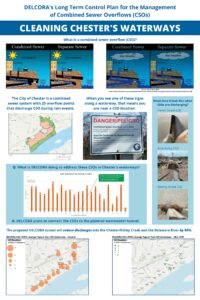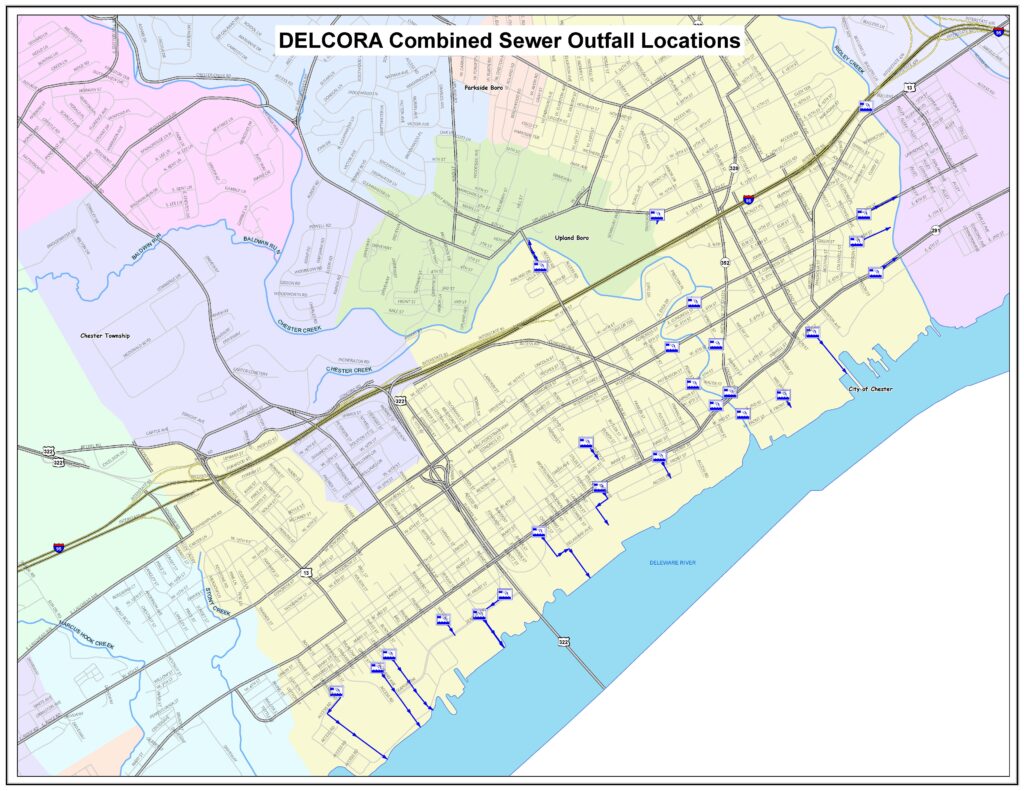Contact Us
Please use this form to contact us about DELCORA CSO LTCP:
Please use this form to contact us about DELCORA CSO LTCP:
DELCORA Resources:
EPA Resources:
Long Term Control Plan Offline Repository Documents:
For more information contact us.
The Delaware County Regional Water Quality Control Authority (DELCORA) entered into a Consent Decree (CD) with the United States Government to establish a schedule for implementation of Long Term Control Plan Update (LTCPU) to achieve full compliance with the Clean Water Act and the regulations and Clean Streams Law and regulations. The lodging of this Consent Decree was entered by the court on August 17, 2015 in Civil Action Case 2:15-cv-04652-RB Document 4 by the United States District Court for the Delaware County Regional Water Quality Control Authority. The Consent Decree was signed and filed on November 10, 2015 by the United States District Court for the Eastern District of Pennsylvania.
Development of Long Term Control Plan
The Long Term Control Plan (LTCP) consists of three major steps, which include system characterization, development and evaluation of alternatives, and the selection and implementation of the controls. This approach will recognize the site-specific nature of CSOs and their impacts on receiving water bodies in order to identify and select CSO controls that are technically feasible, meet the United States Environmental Protection Agency’s (USEPA’s) affordability criteria, and are consistent with the CSO Control Policy. Each step of the LTCP development process has an objective. The main objective of the system characterization is to develop a detailed understanding of the current conditions of the combined sewer system and the receiving waters. This will assist in establishing the baseline conditions and priorities in identifying specific CSO controls. The development and evaluation of alternatives for CSO control will consider a reasonable range of alternatives and varying levels of controls and will consider a variety of factors including cost effectiveness and public input. The selection and implement of the CSO controls will include the selection, adopting, and implementation of the controls as identified and outlined in the long term control planning process. Throughout each of the steps of the LTCP process, public participation will be actively solicited.

DELCORA CSO LTCP March 2022 Submittal
Learn more about DELCORA CSO LTCP:
For more information contact us.
The purpose of the Public Participation Plan (PPP) is to present and document the methods that DELCORA will utilize to actively facilitate public involvement in the decision-making process to develop and select the long-term CSO controls.
The goals of the PPP include addressing the requirements of the United States Environmental Protection Agency (USEPA) Combined Sewer Overflow (CSO) Control Policy to actively involve the affected public in the decision-making to select the long-term CSO goals. The affected public includes rate payer, industrial users of the sewer system, people who reside downstream from the CSOs, those who enjoy these downstream waters, and anyone else who is interested.
To help assist with reaching the entire community DELCORA has created an Offline Repository Binder. This repository will include any submitted and approved documents through the duration of the Long Term Control Plan Update. The Offline Repository Binder can be found at the following locations:
DELCORA Administration Building: 100 E. Fifth Street; Chester, PA 19013
Marcus Hook Municipal Building: 1015 Green Street; Marcus Hook, PA 19061
Ridley Township Municipal Building: 100 MacDade Blvd.; Folsom, PA 19033
Upland Borough Office: 224 Castle Avenue; Upland, PA 19015
J. Lewis Crozer Library: 620 Engle Street; Chester, PA 19013
Chester Township: 1150 Engle Street; Chester, PA 19013
Offline repository binder documents can also be found online under resources.
For more information contact us.
During the CSO control measures evaluation stage, alternative measures that can reduce the impact of CSO discharges will typically fall into one of the following four categories:
After assembling a list of possible control alternatives, the necessary preliminary screening will be conducted in order to better evaluate which control alternatives have the highest potential to protect receiving water quality. The selected alternatives will be screened against evaluation criteria that were selected based upon characteristics of CSO discharges that are measurable and can impact the receiving water. The final CSO control alternatives will be prioritized based on their potential to reduce the CSO discharge frequency and pollutant load to each water body, their cost effectiveness, and on the financial capability.
For more information contact us.
In order to facilitate public involvement throughout the public participation process, there will be four public meetings. At the fourth meeting, DELCORA will discuss and present progress on the development and selection of the alternatives for implementation of the Long-Term Plan. Once the alternatives have been evaluated in detail, but prior to selection of specific CSO controls, the public will be informed of each alternative and ranked based on preference in a draft report. The results of the evaluation will be summarized in an executive summary. The extent of implementation of each alternative evaluated will be based on public input. The schedule and financing method will also be described in the report prior to selection.
The public meetings will be held at one of the following four locations:
The exact time and location of the meetings will be available on this website, in advance of the meetings. An approximate schedule follows:
After each public meeting, a Responsiveness Summary will be prepared. Each Responsiveness Summary will include notifications and information that will be made available to the public at the following meeting. This will include a summary of the meeting presentation and attendance; statements, comments, and questions raised by the public, followed by DELCORA’s responses.
There have been no meetings to date. In the future you may view our Responsiveness Summaries here.
For more information contact us.
DELCORA is responsible for the safe collection, transmission, treatment and disposal of approximately 65 million gallons per day of wastewater generated in southeastern Pennsylvania. DELCORA’s facilities serve residential, commercial, institutional, and industrial customers in Delaware and Chester County. DELCORA owns and operates an extensive system of pump stations, force mains, and sewers that provide the core infrastructure for the transmission of wastewater to treatment facilities in Delaware County and the City of Philadelphia. To support this service area, DELCORA owns and operates over 129 miles of separate and combined sewers. Historically, DELCORA has characterized its service areas as “Eastern” and “Western.” The Western service area discharges to the Western Regional Treatment Plant (WRTP). The Eastern service area discharges to the Philadelphia Water Department’s Southwest Water Pollution Control Plant (PSWPCP).
Under National Pollutant Discharge Elimination System (NPDES) (Permit No. PA0027103), as issued and administered by the U.S. Environmental Protection Agency (USEPA), DELCORA is authorized to discharge a total of 26 combined sewer overflow (CSO) outfalls with 25 discharge points.

For more information contact us.
Combined sewer systems are sewers that are designed to collect rainwater runoff, domestic sewage, and industrial wastewater in the same pipe. Most of the time, combined sewer systems transport all of their wastewater to a sewage treatment plant, where it is treated and then discharged to a water body. During periods of heavy rainfall or snowmelt, however, the wastewater volume in a combined sewer system can exceed the capacity of the sewer system or treatment plant. For this reason, combined sewer systems are designed to overflow occasionally and discharge excess wastewater directly to nearby streams, rivers, or other water bodies.
These overflows, called combined sewer overflows (CSOs), contain not only stormwater but also untreated human and industrial waste, toxic materials, and debris. They are a major water pollution concern for the approximately 772 cities in the U.S. that have combined sewer systems.
For more information contact us.